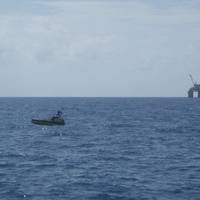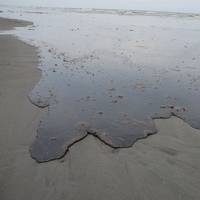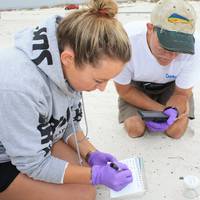ASV Completes GoM Monitoring
ASV has collaborated with the Littoral Acoustic Demonstration Center Gulf Ecological Monitoring and Modeling (LADC-GEMM) consortium to conduct 10 days of Passive Acoustic Monitoring (PAM) data collection for its BP/Gulf of Mexico Research Initiative (GoMRI) funded project. ASV worked closely with Seiche Measurements Limited to integrate its PAM technology on both the C-Worker 6 and C-Enduro Autonomous Surface Vehicles (ASVs). The ASV crew operated from the R/V Pelican coastal research vessel to collect extensive data, which will undergo analysis in the coming months. The two ASV’s were able to identify approximately 30 marine mammals whilst operating in challenging sea conditions up to sea state 5.
ASV Performs Passive Acoustic Monitoring in GoM

ASV informs it has collaborated with the Littoral Acoustic Demonstration Center Gulf Ecological Monitoring and Modeling (LADC-GEMM) consortium to conduct 10 days of Passive Acoustic Monitoring (PAM) data collection for its BP/Gulf of Mexico Research Initiative (GoMRI) funded project. ASV worked with Seiche Measurements Limited to integrate its PAM technology on both the C-Worker 6 and C-Enduro Autonomous Surface Vehicles (ASVs). The ASV crew operated from the R/V Pelican coastal research vessel to collect extensive data, which will undergo analysis in the coming months.
Collaboration Enhances Oil Spill Research

The University of South Florida’s (USF) College of Marine Science announced a new partnership with Agilent Technologies and the Gulf of Mexico Research Initiative (GoMRI) for analytical chemistry equipment to study oil spills. Funded by GoMRI and Agilent’s Research Support Program, the partnership will allow access to cutting-edge analytical instrumentation to better understand the effects of oil as well as other emerging contaminants in the environment. The Center for the Integrated…
Long-term Study May Reveal Deepwater Horizon Impacts

The Harte Research Institute (HRI) for Gulf of Mexico Studies at Texas A&M University-Corpus Christi will receive approximately $1.25 million over the next three years to work with Mexican colleagues in the southern Gulf of Mexico to look for residual impacts from the Ixtoc I oil spill of 1979-1980 on coastal areas, fisheries, and the deep sea. This long-term study will reveal what impacts may be in store 30 years after the 2010 Deepwater Horizon spill. Dr. Wes Tunnell, Associate Director of HRI, is leading the project. He is joined in this research effort by HRI endowed chairs: Drs.
Scientists Train Students on Oil Spill Research

As part of ongoing research nearly four years after the Deepwater Horizon oil spill, scientists from the Woods Hole Oceanographic Institution (WHOI) will team up with a group of high school students in Florida to collect remnants of oil from Gulf Coast beaches this week. Marine chemist Chris Reddy studies how the many compounds that compose petroleum hydrocarbon, or oil, behave and change over time after an oil spill. He and his researchers have collected and analyzed about 1,000 oil samples from the Gulf Coast since the Deepwater Horizon oil spill.
$1.3 Million Grant for Deepwater Horizon Research
University of Georgia marine scientist Samantha Joye, who is the Athletic Association Professor in Arts and Sciences, and UGA colleagues Patricia Medeiros and Christof Meile have received a $1.3 million grant from the Gulf of Mexico Research Initiative that will enable UGA researchers and scientists from 13 other institutions to understand more thoroughly the ecosystem impacts of the 2010 Deepwater Horizon oil spill. The three-year grant, awarded through a competitive merit-review process by a board comprised of researchers from academic institutions, will allow scientists and emergency responders to better predict and respond to future spills, should they occur.





